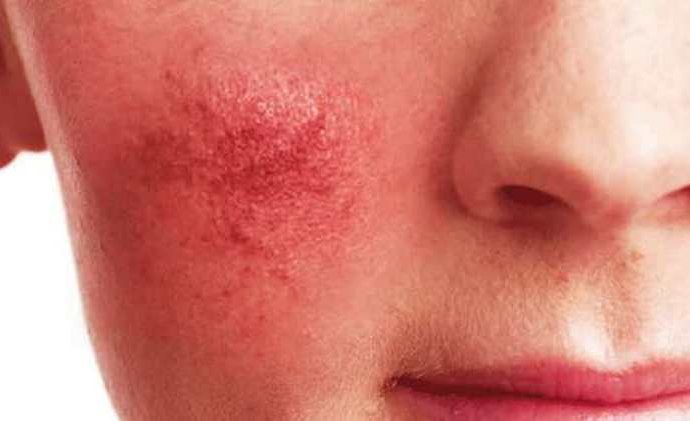
Ayurveda Rosacea
A core philosophy in Ayurveda is that a healthy inside is necessary for a healthy outside. While that's quite relevant to maintaining healthy skin in general, it becomes particularly significant in the management of some of the hardest-to-treat skin conditions like rosacea and adult acne.
The difference in the Ayurvedic approach (compared to traditional medical treatments) is in pacifying the internal aggravating factors while simultaneously addressing topical issues.
With that in mind, here are some time-tested Ayurvedic practiced for dealing with four complex skin problems: rosacea, eczema, psoriasis, and adult acne.
Before I get into the different issues, let's start with healthy skin practices that can benefit everyone:
1. Include more turmeric and iron in your diet.
Ayurvedic doctors recommend consuming nearly a teaspoon of turmeric every day (you can also use it topically!), and luckily, there are many ways to get your fill: cook with it, drink it in your favorite green juice, pop an organic turmeric capsule.
2. Use less soap and the right water temperature.
Because of its tendency to dry out the skin, soap generally shouldn’t be used on your face on a daily basis. The same goes for the temperature of the water you wash your face with.
Figuring out what your dominant dosha is can help determine the right way to cleanse your skin: Vata skin is usually thin and dry, so foaming soaps should be avoided and cool, tepid water should be used when cleansing. Pitta skin tends to be sensitive and congested, so soap and cool water can be used more frequently. Kaphas' oily skin can benefit from washing with warmer water.
3. Massage your body with oil.
Massaging oil over your whole body is an excellent way to promote circulation and detox, both necessary for fighting skin ailments and removing the stagnation that causes them. Vatas should use sesame oil, pittas should use sunflower oil, and kaphas should use corn or canola oil.
Now for more specific, issue-based Ayurvedic skin advice:
Rosacea
Rosacea is believed to emanate from a pitta imbalance, so Ayurvedic solutions focus on bringing that dosha into balance. Since Western medicine has no topical "cure" for rosacea, paying attention to the internal factors that cause the condition are crucial.
According to Ayurvedic tradition, someone with a pitta imbalance is considered to have a hot body and internal temperature, so a diet of cool, sweet, stabilizing foods should replace those that are salty, sour, spicy, or pungent. (You can find more tips on the proper diet to treat a pitta imbalance here.)
In terms of skin care, skip your skin-aggravating morning face wash for honey. Apply a layer of honey to the face before jumping in the shower, and then remove it with a warm washcloth. A chamomile compress can also be very helpful when experiencing a flare-up, as chamomile is an excellent natural treatment for redness. Cold cucumbers applied to the skin can also provide rapid relief.
Pitta-balancing yoga poses like boat, bridge, and chair will also help.
Eczema
“Dry” skin conditions such as eczema are believed to emanate from vata imbalance, and addressing that imbalance is an important step in treating the condition. Dietary modifications can help in a big way: avoid dry fruits, apples, melons, potatoes, tomatoes, eggplants, beef, and peas, as these all aggravate vata further. Consumption of avocados, sweet fruits, cherries, and oranges will help bring your vata back into balance.
Aloe vera gel or cream may also be used to gently massage the affected areas to add extra moisture. Antioxidant- and oil-rich avocado has a number of benefits for the skin and is full of healthy fatty acids and vitamins. Mash up an avocado into a smooth paste and apply it evenly to the affected areas. Once it dries (15 minutes), rinse off with cold water. You can also massage a few drops of almond oil into the skin for relief.
Physically, vata-balancing yoga poses like Warrior I and II and tree can help.
Psoriasis
Within Ayurveda, there's a special relationship between the skin and kidneys since the excretion of watery wastes is primarily the function of these two organs. Proper balance of urine and perspiration are related to pitta, and psoriasis is considered to be an example of a disease resulting from an imbalance of perspiration and urine in the body.
Responding to natural urges in a timely manner is a good practice for all but especially recommended for those with psoriasis to maintain the body’s excretion balance. Toxin buildup can be a psoriasis trigger, and additional detox measures can be very helpful in preventing flare-ups.
In terms of food, avoid salty, sour, or acidic foods. An Ayurvedic topical solution is to place a fresh banana leaf on the lesion to allow the healing nutrients of the leaf to penetrate your skin.
A series of yogic sun salutations can also be very effective for detox, as can anxiety-calming practices such as meditation and Pranayama (Shitali Breath will be particularly helpful).














